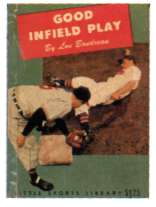 |
Home | Search | Browse | About IPO | Staff | Links |
 |
Home | Search | Browse | About IPO | Staff | Links |
|
FROM THE EDITOR  As adults, we are gifted with uncanny hindsight. Often, we can pinpoint a moment when the red flag was raised, and we trampled it: like that morning in the gas and go when I decided, "A couple of those brown sugar cinnamon packs of pop tarts won't hurt. They were so good yesterday." I'd like to think that I've now overcome that self-destructive pattern, but people who know tell me it's a one-day-at-a-time kind of thing. This spring, I absolutely buried another one of those red warning flags when I responded to an e-mail from the organizers of my son's T-ball league. "Well," I typed, "If you can't convince anybody better (and that would be anybody else in the world), I probably could coach." That's how it came to be me in front of a group of nervous, inattentive five-and six-year-olds in the middle school gym the rainy Saturday morning of our first practice. My only qualifications were a few seasons of horrible Little League at bats (when the bats were wood) and the fact that the only bedtime story my father ever read to me was Good Infield Play by Lou Boudreau, the player-manager of the 1948 world champion Cleveland Indians. (If all else failed, I could always teach the Ted Williams shift.) Now, after the end of the season, I'm not sure if the players ever noticed (or cared about) my remarkable inability. But I did notice this about my team: Here were a dozen children from a video game generation inflicted with a propensity for obesity, and not one was overweight. For the most part, the other teams in the league looked thin too. I guess because, barring any disease, children almost always naturally start out fit. But, somewhere along the way, kids don't heed the pop tart red flag. They probably don't even recognize it. That's when the danger starts, and that's why adults need to step in and teach children what it takes to grow up healthy. After reading this issue of IP&R, it occurs to me that the way to help kids form healthy habits isn't to try to make them fearful of the consequences of inactivity or poor food choices. (After all, the dangers of heart disease and type 2 diabetes are as esoteric and meaningless to children as the idea of shifting the center fielder, shortstop and third baseman to the right side of the diamond to defend against a dead-pull leftie.) What we ought to do - and what Illinois park and recreation professionals are so equipped to do - is to offer our children positive leisure time alternatives. Using such programs as Camp Fusion (page 30) or the Let's Just Play Go Healthy Challenge (page 26), you emphasize the fun of physical activity and, incidentally, you build the groundwork for children's maturing awareness of making healthy choices. Park and recreation officials and professionals are the ones who can show children that XBOX rip offs are nowhere near as much fun as real tennis or biking or skateboarding or baseball out on a real grass diamond with a real team full of real friends and a real manager. Even a manager with a 60-year-old playbook. — RODD WHELPLEY Editor 4 Illinois Parks & Recreation www.ILipra.org |
|
|